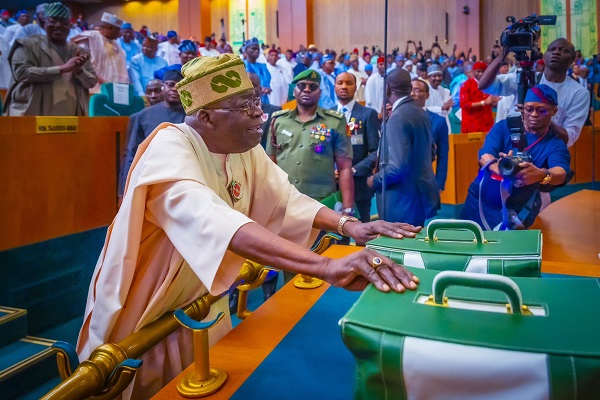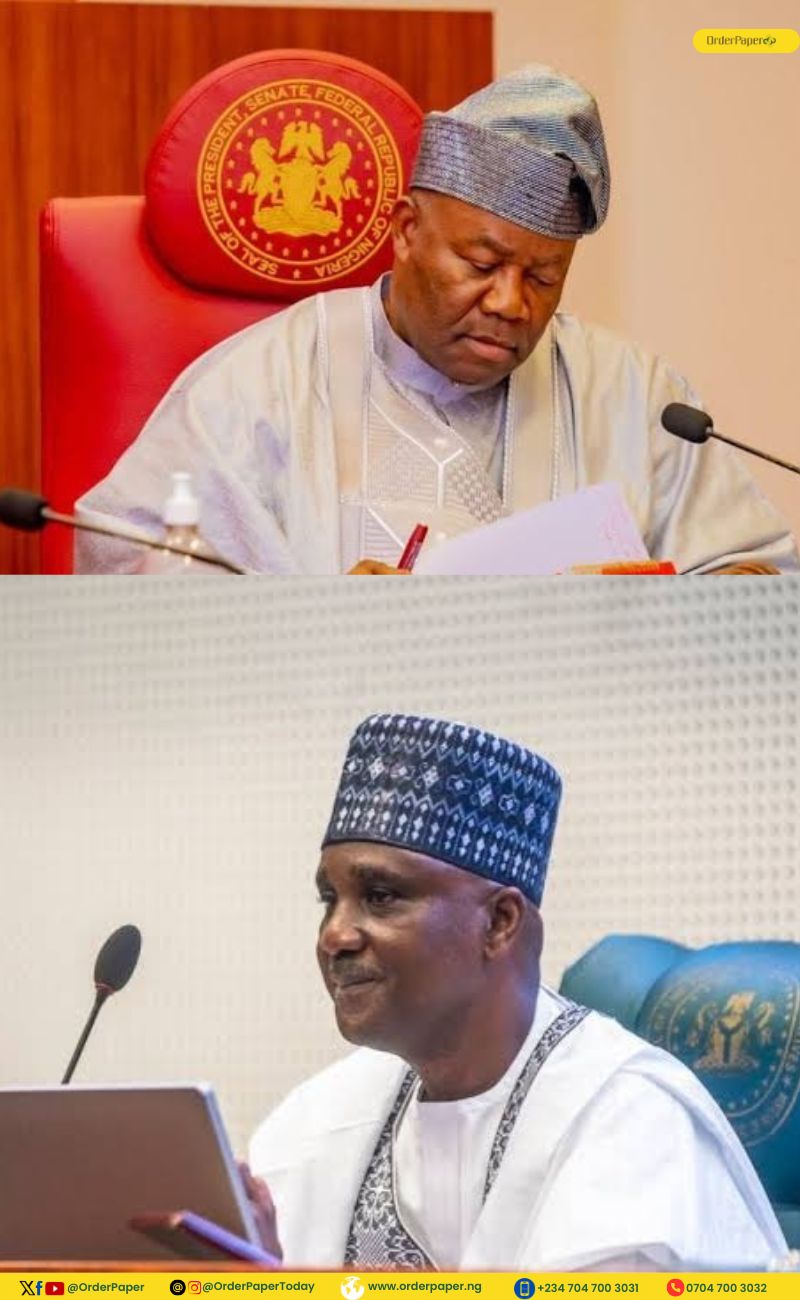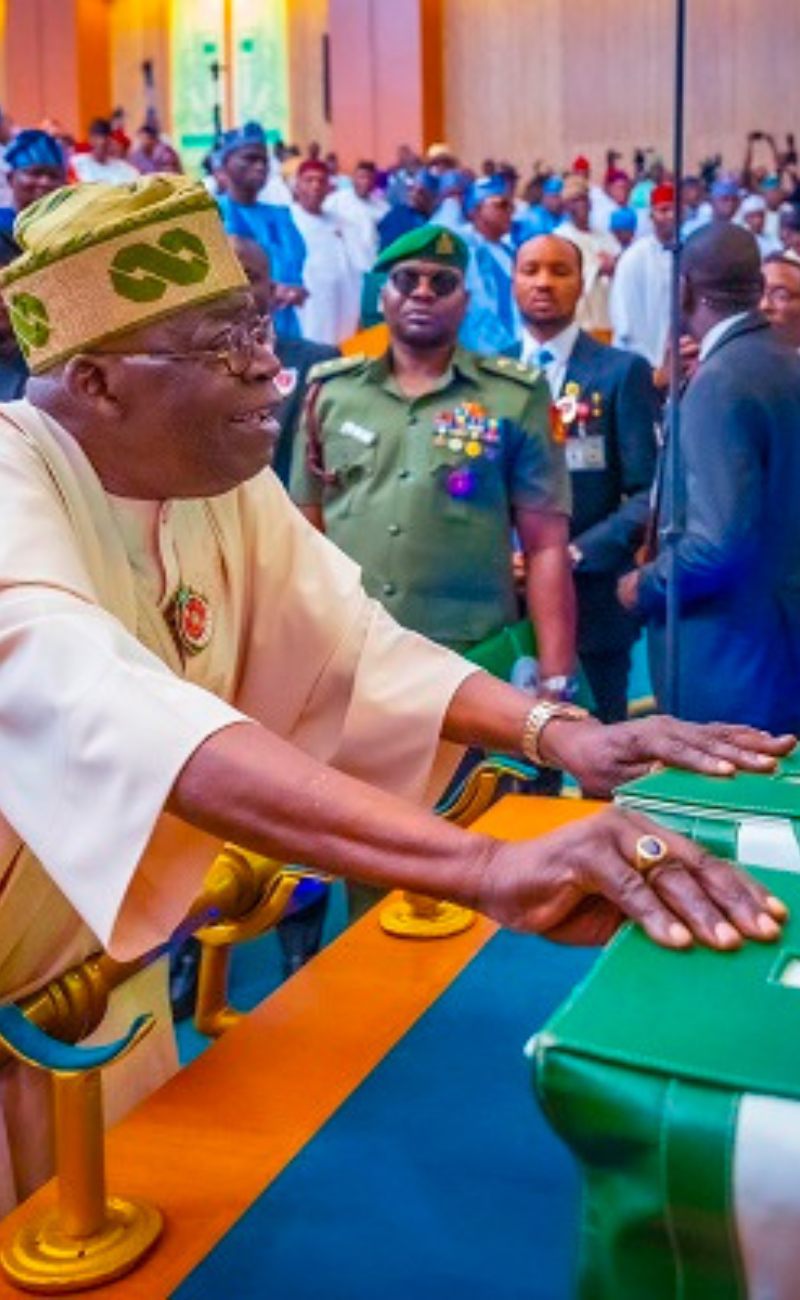Following a robust debate by senators present, the President of the Senate, Godswill Akpabio referred the budget to the committee on Appropriation to report back in four weeks.

The senate has passed for second reading the 2024 Appropriation Bill of ₦49.7 trillion which was presented before the joint session of the Senate and House of Representatives by President Bola Tinubu on Wednesday, December 18, 2024.
The 2025 budget presented by Tinubu is themed “Securing Peace, Rebuilding Prosperity.” Presenting the budget, President Tinubu requested the lawmakers to approve an extension of the 2024 budget to ensure that the government can fully utilise all components of the budget.
The senate had thereafter dissolved into its separate session and debated on the proposed extension which subsequently led to the approval of an extension for the implementation of the capital aspect of the 2024 budget to run until June 30, 2025.
Meanwhile, presenting a lead debate on the general principles of the budget on the floor of the senate during Thursday’s pleary, the Leader of the Senate, Opeyemi Bamidele noted that the bill is deemed to have been read the first time by virtue of being laid at the joint session of the national assembly.
READ ALSO: Senate extends implementation of 2024 budget till June 2025
He mentioned that the bill seeks to authorise the issue out of the Consolidated Revenue Fund of the Federation the total sum of ₦49,740,165,355,396 (Forty-Nine Trillion, Seven Hundred and Forty Billion, One Hundred and Sixty-Five Million, Three Hundred and Fifty-Five Thousand, Three Hundred and Ninety-Six Naira) only for the year ending on the 31st day of December, 2025.
He said, “The 2025 budget proposals christened, “Budget of Restoration: Securing Peace, Rebuilding Prosperity,” strikes at the very core of the Renewed Hope Agenda and demonstrates this administration’s commitment to stabilising the economy, improving lives, and repositioning our country for greater performance.
“The 2025 budget has seen a significant increase of 74.18%, reaching N47.9 trillion in nominal terms, signaling a bold fiscal strategy aimed at addressing persistent infrastructure gaps and development challenges. However, in dollar terms, the budget contracted by 23.22%, dropping from $36.7 billion in 2024 to $28.18 billion in 2025. This reduction in real value limits the potential impact of the budget on economic growth and the well-being of the population.
“It is important to note at the outset, that this proposal is not strange to us here in the National Assembly having approved MTEF and the Medium Term Fisca Framework. What remains for us is to closely examine the contents and the detail in order to sort things out and smoothen the rough edges.”
He further major highlights of the budget which consist of –
Basic Assumptions and parameters
– Oil Price Benchmark of 75 US Dollars per barrel
– Daily oil production estimate of 2.06 million barrels per day (mbpd).
– Exchange rate of 1,500 Naira per US Dollar.
– A total of 13.08 trillion naira or 4.6 percent of GDP.
– 15.75 percent inflation rate
2025 revenue and expenditure summary
– Proposed Expenditure: N47.90 trillion
– Total Retained Revenue: N34.82 trillion
– Fiscal Deficit: N13.08 trillion
Key priorities towards rebuilding Nigeria
Total expenditure is projected to be 47.90 trillion naira and key notable highlights of the 2025 Budget Allocations which are aimed towards rebuilding the country are:
– Defense and Security: N4.91 trillion
– Infrastructure: N4.06 trillion
– Health: N2.48 trillion
– Education: N3.52 trillion
– 15.81 trillion naira for debt servicing
– Others N17.12 trillion
Bamidele, providing an overview of the 2025 budget, noted that it aligns with its theme of “Securing Peace and Rebuilding Prosperity.” He described the proposal as a bold and ambitious roadmap for revitalising the nation’s socio-economic fabric.
He highlighted key projections, including a significant reduction in inflation from 34.6% to 15%, an improvement in the exchange rate from approximately ₦1,700 per US dollar to ₦1,500, and a targeted crude oil production level of 2.06 million barrels per day (mbpd). The budget according to him also aims to cut down on petroleum imports while boosting exports of finished petroleum products, ensuring increased foreign exchange inflows through foreign portfolio investments and higher crude oil output and exports.
Additionally, Bamidele pointed to expectations of a bumper agricultural harvest driven by enhanced security, which would reduce reliance on food imports. He underscored the government’s commitment to lowering upstream oil and gas production costs, a move aimed at bolstering efficiency and economic gains.
Contributing to debate, Sen. Abdul Ningi (PDP, Bauchi Central) expressed cautious optimism about the 2025 budget, emphasising the critical role of the National Assembly in shaping it to address the nation’s challenges. He noted that while the President has presented his proposals, the real question lies in what Parliament can do to refine and enhance them for the benefit of Nigerians.
Ningi stressed the need to prioritize outcomes that improve citizens’ lives, such as addressing hunger, economic hardship, and security concerns. He highlighted security as the foundation for progress, urging the President to devote significant attention to it.
“As a parliament, it should not be about what the president brought, it should be about what the parliament can do with what the president brought.
“What have we done in making sure that our power has been clearly expressed in 2024? It is important for all of us to understand that, apart from the volume.
“At the end of the day, how do our people feel? What is their economic position? Are we improving their economic position? Have they improved from 2023 and 2024? What about hunger? What about the security?”
Reflecting on past budget performances, he called for a concerted effort to ensure the 2025 budget performs significantly better. He reminded Parliament of its responsibility to oversee the budget’s implementation and ensure it brings tangible improvements to the lives of Nigerians, fostering a renewed sense of hope and progress.
Sen. Tahir Monguno (APC, Borno North) emphasised that the protection of lives and property is the fundamental responsibility of any government, warning that a government that neglects this duty risks losing its legitimacy. He acknowledged the allocation of ₦2.6 billion to infrastructure as a significant step toward economic development, noting its potential to generate a multiplier effect. However, he expressed concern that without effective implementation, such allocations would remain mere projections with no tangible impact on citizens’ lives.
“My main concern is no matter how beautifully couched, no matter how beautifully presented, if they are not implemented, they remain in the realm of mere estimates that will not translate into creating concrete realities or concrete development for the illustrious people.”
Monguno urged the executive arm to prioritise budget implementation, referencing the President’s recent disclosure that only 48% to 50% of the current budget had been executed. He called for a significant improvement, suggesting that implementation levels should reach at least 80% or 90%.
The senator also highlighted the challenges posed by the “bottom-to-top” policy approach, which he described as a source of bureaucratic bottlenecks hindering budget execution. He called on the Ministry of Finance and the Finance Committee to address these issues, stressing the need to eliminate red tape and streamline processes to ensure the budget delivers on its promises.
Sen. Adams Oshiomhole (APC, Edo North) highlighted the critical importance of security in national development, stating that no sector can thrive without it. He supported the allocation of the largest portion of the budget to defense, emphasising that it reflects the nation’s pressing need to address insecurity. However, he noted that budgetary provisions alone are insufficient to achieve the desired outcomes.
“Giving all that we have faced as a nation with regards to insecurity, I am now convinced, more than ever before, that none of those other important sectors can be safe unless we have security and therefore, like all those who have spoken before me have said, I can’t question why defense would have a lion’s share of the budget.
“But the lessons we have learned since we assumed duties here is that budgetary provisions alone will not translate to the kind of outcome Mr. President spoke to.”
Oshiomhole called for a shift in defense policies and procurement strategies, advocating for a stronger focus on technology to enhance security capabilities. He underscored the need for a smarter, more robust, and effective defense system, urging the senate’s defense committee, led by the immediate past senate president, to adopt a more focused and strategic approach to its oversight responsibilities.
“Our defense policies or management of our defense procurement should be guided in a way as to lay more emphasis on technology and have more security. We need to have a much more smart, robust, and effective defense system.
“This will require that our defense committee, which most happily is chaired by the immediate past senate president, will need to be refocused,” he stressed.
While Sen. Asuquo Ekpenyong (APC, Cross River South) called for the budget to include provisions for the South West Development Commission, Sen. Victor Umeh (LP, Anambra Central) expressed concern over the omission of the Port Harcourt-Maiduguri Eastern Railway Line in the President’s budget speech. While acknowledging plans to construct the Sokoto-Badagry and Lagos-Calabar highways, Umeh highlighted the importance of the Eastern Rail Line, which he had previously championed through a motion co-sponsored by 35 senators. The motion had called for the Federal Government to build a standard-gauge railway from Port Harcourt to Maiduguri, and it was unanimously adopted by the Senate.
“You will recall that I brought a motion here for the Federal Government to build the Eastern Railway Line and that motion was co-sponsored by 35 senators. It was unanimously resolved that the President should build standard-age rail from Port Harcourt to Maiduguri.”
Umeh urged his colleagues to ensure that the Eastern Rail Line is included in the detailed budget breakdown. He called for Senate intervention if the project is not accounted for, stressing its significance for regional connectivity and economic development.
“So I want to draw the attention of the Senate to that let’s hope that it is in the breakdown but in the event that it is not there, I would like the senate to intervene.”
Following a robust debate by senators present, the President of the Senate, Godswill Akpabio referred the budget to the committee on Appropriation to report back in four weeks.



